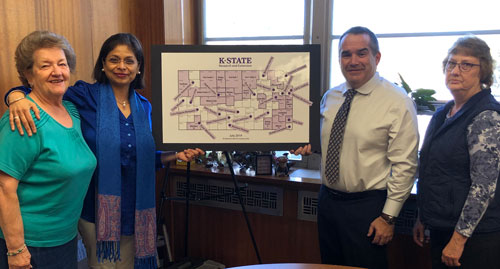October 25, 2019
Q&A with Fulbright Scholar Vinita Godinho
Submitted by Communications and Marketing

As part of the national Fulbright Scholar Program, K-State's Oz to Oz Fulbright Scholars Seminar brings senior research scholars to campus to build and develop international partnerships and friendships. Vinita Godinho, general manager advisory at Good Shepherd Microfinance in Australia spoke with several groups across the university's Manhattan campus.
This Q&A with Godinho gives the university community an opportunity to learn more about the scholar and reinforces the importance of mutual understanding and education of diverse research topics.
What is your name, title and institution?
Vinita Godinho, general manager advisory at Good Shepherd Microfinance in Australia.
What is your field of study?
I am an economist, and my field of study is behavioral economics, which seeks to understand why people make the financial choices they do. In particular, I am very interested in exploring how we can design programs that encourage Australians on low incomes to save more, as research consistently finds that Australia has the lowest rate of active savings, and overall financial well-being when compared to other developed economies.
How is the Fulbright scholarship helping you increase knowledge of this area?
The Fulbright scholarship is enabling me to spend three months based at the Center for Financial Inclusion in Washington, D.C., to collaborate with their research team and partners, and explore how they are motivating positive savings behaviors. I am also proactively seeking to develop ongoing partnerships with like-minded thought leaders, as the pursuit of financial well-being is a shared goal across the world, so connecting global efforts to share learnings and insights is in everyone's best interests.
What drives your interest in your research?
I am a banker by profession, and have more than two decades of experience in financial services provision in India and Australia, so I have always been fascinated by how people feel about money, how they make financial decisions, and how the industry can help them to manage their money better so that they can achieve their own financial goals. This passion resulted in my undertaking doctoral studies amongst indigenous Australians — my thesis was on the understanding of money amongst remote, regional and urban indigenous communities, and what this means for efforts to enhance their financial well-being.
Why did you accept the invitation to visit K-State?
When John Leslie visited the Fulbright scholars in Canberra, I was keen to learn more about K-State's extension program. This is quite unique as it is extending the reach of the university into the community, and prioritizing their needs to drive research. I firmly believe that research should transform lives in the community and drive innovation in the industry, instead of just focusing on journal publications.
I have been so impressed by my time with Gregg Hadley at K-State, as well as the opportunity to meet many of the teams that work with him to achieve the objectives of the Extension program, i.e., "expanding human capacity by delivering educational programs and technical information that result in improved leadership skills in the areas of communication, group dynamics, conflict resolution, issue analysis, and strategic planning that can enhance the economic viability and quality of life in communities."
I hope I can take these learnings back home, and collaborate with Gregg and others to introduce a similar program in Australia!
